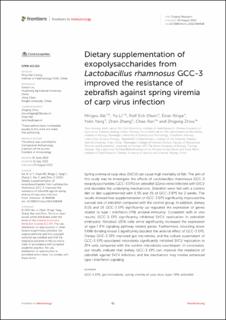Dietary supplementation of exopolysaccharides from Lactobacillus rhamnosus GCC-3 improved the resistance of zebrafish against spring viremia of carp virus infection
Xie, Mingxu; Li, Yu; Olsen, Rolf Erik; Ringø, Einar; Yang, Yalin; Zhang, Zhen; Ran, Chao; Zhou, Zhigang
Peer reviewed, Journal article
Published version
Permanent lenke
https://hdl.handle.net/11250/3034836Utgivelsesdato
2022Metadata
Vis full innførselSamlinger
- Institutt for biologi [2571]
- Publikasjoner fra CRIStin - NTNU [38047]
Sammendrag
Spring viremia of carp virus (SVCV) can cause high mortality of fish. The aim of this study was to investigate the effects of Lactobacillus rhamnosus GCC-3 exopolysaccharides (GCC-3 EPS) on zebrafish (Danio rerio) infected with SVCV and elucidate the underlying mechanisms. Zebrafish were fed with a control diet or diet supplemented with 0.5% and 1% of GCC-3 EPS for 2 weeks. The results showed that supplementation of GCC-3 EPS significantly improved the survival rate of zebrafish compared with the control group. In addition, dietary 0.5% and 1% GCC-3 EPS significantly up-regulated the expression of genes related to type I interferon (IFN) antiviral immunity. Consistent with in vivo results, GCC-3 EPS significantly inhibited SVCV replication in zebrafish embryonic fibroblast (ZF4) cells while significantly increased the expression of type I IFN signaling pathway related genes. Furthermore, knocking down TANK-binding kinase 1 significantly blocked the antiviral effect of GCC-3 EPS. Dietary GCC-3 EPS improved gut microbiota, and the culture supernatant of GCC-3 EPS-associated microbiota significantly inhibited SVCV replication in ZF4 cells compared with the control-microbiota counterpart. In conclusion, our results indicate that dietary GCC-3 EPS can improve the resistance of zebrafish against SVCV infection, and the mechanism may involve enhanced type I interferon signaling.

